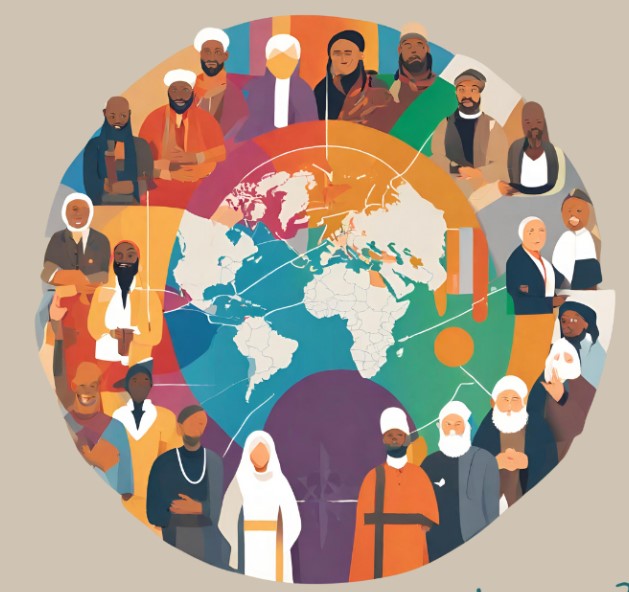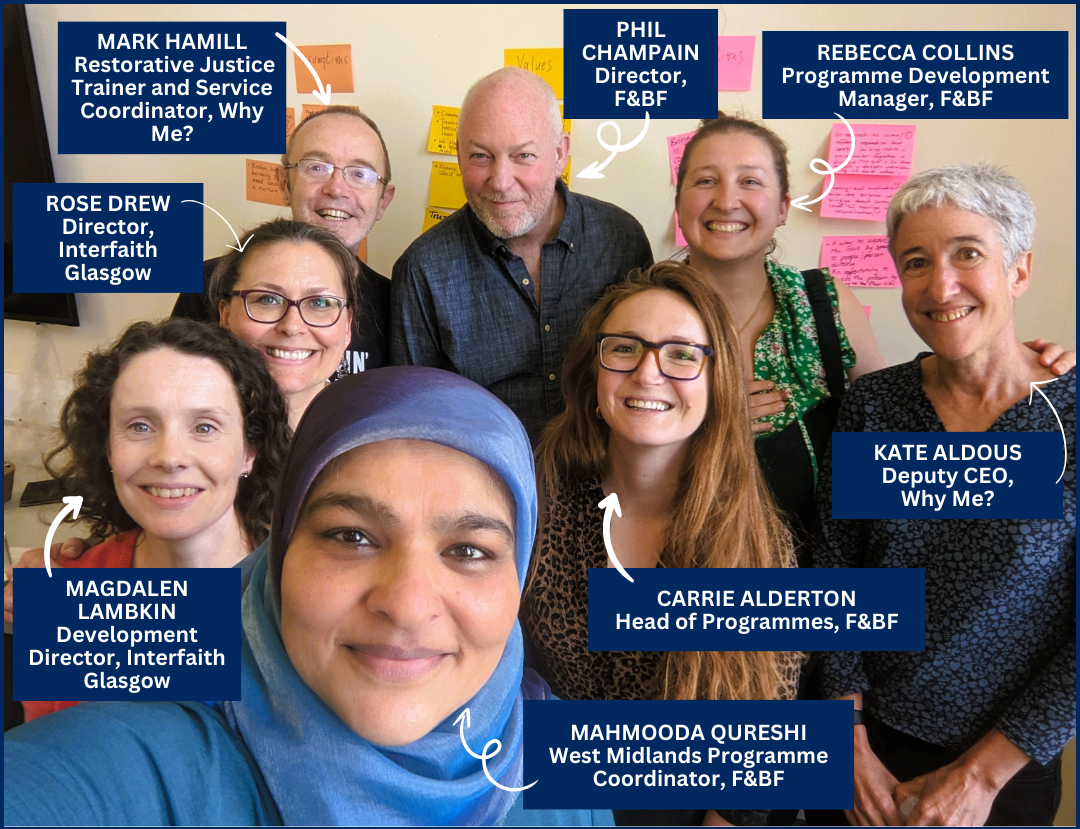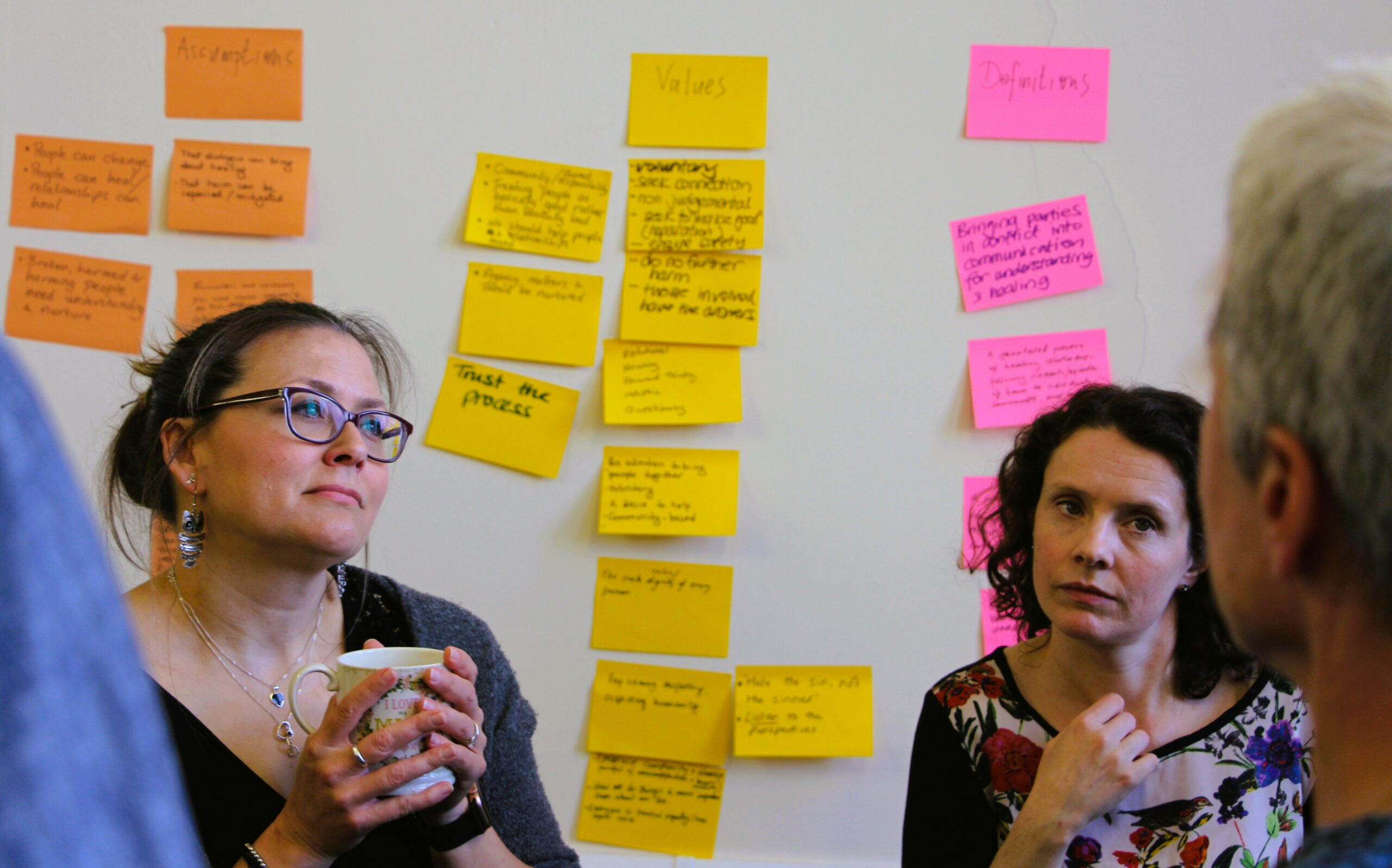
Menu
Menu

19 / 06 / 24
This article includes reflection from Rebecca Collins from F&BF and Mark Hamill from Why Me? An earlier version of this article appeared on Why Me?’s website. F&BF is partnering with Why Me? and Interfaith Glasgow to deliver the Interfaith Restorative Justice project in Glasgow and Solihull.
Interfaith Restorative Justice (IRJ) has never been done before. It brings together two parallel worlds: Interfaith and Restorative Justice (RJ). F&BF is partnering with RJ experts, Why Me?, and Interfaith Glasgow over the next three years to pioneer novel ways of addressing faith based hate the UK. The programme is thanks to a grant from the National Lottery Community Fund and will take place in two locations: Solihull and Glasgow.
IRJ is just taking off and, in this article, Rebecca from F&BF and Mark from Why Me? share their thoughts on the partnership so far and what they are thinking about as we begin to explore new ways to create real change.

We’ve teamed up with Why Me?, and Interfaith Glasgow, on this brand new Interfaith Restorative Justice project to bring restorative approaches to faith-based hate in Solihull and Glasgow. Mark’s blog below tracks our first partner meeting and training together in Glasgow that took place at the end of April.
This project is an exciting overlap of both interfaith and restorative work – something we’ve not tried before, but are really excited to explore.
But what is restorative justice? And what does it have to do with interfaith?
Restorative Justice is an alternative to traditional ‘punitive justice’ – which focusses on punishment. Restorative Justice focuses on helping victims to communicate the impact of harm, holds people accountable for their actions in a non-shaming way, and aims to facilitate healing that allows both the harmed and harmer to move forward. In short, it’s about healing and restoring relations between individuals – and communities.
It can manifest in many different ways, from structured and expertly-facilitated face-to-face meetings between victims of crime and their perpetrators, to informal restorative conversations around a kitchen table about family tension.
We hope it will be empowering for faith communities in Solihull and Glasgow to reflect on the myriad ways restorative practices could address faith-based conflict and hate. We know that experiencing hate crimes and hostility based on race, religion, disability, sexual orientation, or gender identity (or perceived membership in any of these groups) can be both deeply upsetting to the individual, and can create further ripples of harm throughout the wider faith community.
Hate crime can feel more personal than other crime; it can feel like “an attack on the core of your identity”, rather than merely bad luck or being in the wrong place at the wrong time.
We want to explore how restorative practices can address the significant harms caused by hate and hostility. We hope this will not only provide much needed healing to those who have been subjected to it, but will also work with those who inflict hate to help them take responsibility for the harm they’ve caused and understand the impact on those they have harmed.
We’ll be working with our new Partner from Why Me? and Interfaith Glasgow for the next three years to explore how restorative approaches could be implemented by faith communities in Solihull and Glasgow – check out our new Interfaith Restorative Justice programme page for all the latest news and updates.
 Mark Hamill, Why Me?
Mark Hamill, Why Me?At the start of May, Why Me? delivered Restorative Justice training across two days for our project partners, The Faith and Belief Forum and Interfaith Glasgow.
The training took place in Glasgow and was a ‘deep dive’ into all things Restorative Justice. A lot of discussion took place around the key themes of empathy, responsibility and safeguarding, focussing on a range of case studies.
Training also included input from Rob, a Why Me? ambassadors, who talked movingly about the transformative power of Restorative Justice in his own life. Everyone had the opportunity to practise their ‘restorative skills’ through role playing separate pre-meetings with the harmer and the harmed in a fictional case study. The group made the decision not to proceed with a restorative conference due to concerns over the harmer’s mental wellbeing. They planned to discuss the offer with him at a later date.
The training also revealed the synergy and shared values of Restorative Justice and interfaith dialogue, touching upon the roots of RJ in different faith traditions. Most of all, the training provided an opportunity for the project team to learn more about each other and to bond over our shared vision of using restorative practices to prevent and address interfaith conflict. Recruitment of community facilitators in both Glasgow and Solihull is ongoing. It is estimated that their training will take place in autumn of this year.
I am looking forward to further developing these connections as we deliver this innovative and exciting project over the next three years!